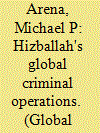|
|
|
Sort Order |
|
|
|
Items / Page
|
|
|
|
|
|
|
| Srl | Item |
| 1 |
ID:
077339


|
|
|
|
|
| Publication |
2006.
|
| Summary/Abstract |
The Lebanese Hizballah first emerged in the early 1980s as a loosely affiliated group of Shia militants but has since evolved into a sophisticated organization with several thousand supporters and members, and a multi-dimensional infrastructure. The group receives a significant portion of its funding from Iran, although, several highly publicized media reports released over the last several years revealed Hizballah also receives substantial monetary support from a worldwide network of criminal operations. This endeavor explores four criminal enterprises believed to be used to provide funding to the organization: Intellectual Property Crime, drug smuggling, cigarette smuggling, and the exploitation of the African diamond trade. A brief description of each enterprise is provided along with instances in which Hizballah's members and supporters have been found to be involved in such crimes and some indication of how much money has been funneled to the larger organization. The future of Hizballah's reliance upon this criminal network for financial sustenance is tentatively examined in light of increasing law enforcement attention and recent fighting with Israel.
|
|
|
|
|
|
|
|
|
|
|
|
|
|
|
|
| 2 |
ID:
156829


|
|
|
|
|
| Summary/Abstract |
Cigarette smuggling across Brazil’s borders with Paraguay, Uruguay and Argentina involves large amounts of merchandise and money. The public in Brazil associates this activity with images of war, contamination and other threats to state sovereignty. This article assesses the political meaning and uses of smuggling in order to challenge the assumption that smuggling threatens the sovereignty of the Brazilian state. With the help of a literature review, fieldwork at the border, interviews with practitioners, a cartographic analysis of news coverage of seizures, the tobacco production and consumption, the market and its regulation, actors, routes and networks were mapped and analysed. In the Southern Cone of South America, an integrated transborder territory emerges where tobacco is cultivated, prepared and distributed, and cigarettes are manufactured, transported, sold and smoked. These flows cross distinct legal framings and lead to an increase in danger and profit. Thus, the market is segmented between national legal products and imported cigarettes that are cheaper and illegal but easily obtainable. The concepts of political commodities understood as the acts of powerful agents who barter advantages related to their authority and sovereignty management, understood as the use of legal (state-managed) structures according to private interests at different scale levels, provide useful theoretical tools to examine the territorialisation of the cigarette smuggling and its control by the state and private agents. We conclude that tobacco production and trade, as well as cigarette smuggling, are connected via agents who use the border to build the legal market and, consequently, to increase the trade value of national tobacco. Cigarette smuggling across the state borders of the Southern Cone combines networks and places in such a way that is integrated into the legal economy and the national territories, and it does not defy state’s sovereignty.
|
|
|
|
|
|
|
|
|
|
|
|
|
|
|
|
|
|
|
|
|